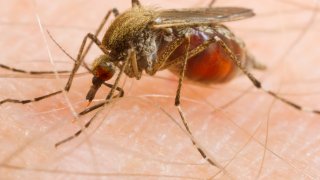
Scientists at the University of California San Diego received a $1.4 million grant to study new genetic technologies intended to curb mosquito populations and fighting the spread of malaria, it was announced Wednesday.
The Bill & Melinda Gates Foundation grant will also allow researchers to mitigate hazards associated with using gene-editing systems in the wild, according to UC San Diego.
"My lab, historically, was a fruit fly lab," said Ethan Bier, a UC San Diego distinguished professor of developmental biology and science director for the Tata Institute for Genetics and Society.
Get San Diego local news, weather forecasts, sports and lifestyle stories to your inbox. Sign up for NBC San Diego newsletters.
"About five years ago in collaboration with the laboratory of Anthony James at UC Irvine, we started transferring some of our genetic strategies into mosquitoes," Bier said in a statement. "We're very fortunate that the Gates Foundation is supporting the continuation of that work."
Bier and his colleagues at UC San Diego and elsewhere are working on next-generation gene drive systems based on CRISPR, a technology used for editing genes.
When deployed, these technologies could potentially spread through mosquito populations in one season -- immunizing mosquitoes against malarial parasites or acting as genetic insecticides -- and decreasing the insects' numbers.
Local
Related approaches might also help reduce other mosquito-borne pathogens including the viruses that cause dengue fever, Zika, chikungunya, yellow fever and West Nile disease.
Malaria is a disease transmitted by anopheline mosquitoes and infects more than 200 million people globally every year, causing over 600,000 deaths, mostly in young children under 5 living in sub-Saharan Africa.
According to UC San Diego, the mosquito project has another goal as well: addressing relevant social and ethical challenges, in connections with a type of genetic engineering known as "gene drives," and other advanced technologies.
UC San Diego scientists and their colleagues are also working on two neutralizing systems that address the risks of releasing gene drives into mosquito populations in their natural habitats.
"There's been a lot of concern that there are so many unknowns associated with the spread of gene drives in the wild," Bier said. "Now we have developed drives with limited ability to spread, and mitigating systems to remove or halt drives if necessary."
One neutralizing system -- called element reversing the autocatalytic chain reaction -- is designed to eliminate the gene drive. The ERACR copies itself and replaces the gene drive, as shown in research on fruit flies.
Along with transferring ERACR technology to mosquitoes, another goal is building on other mitigation systems developed by the Bier group in flies to develop self-limiting genetic systems in mosquitoes.
According to UC San Diego, most of Bier's current work focuses on creating the right elements to mitigate risks, collaborating with the University of California Malaria Initiative on expanded research, and speeding up approval for the technology to be used in nature.



